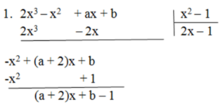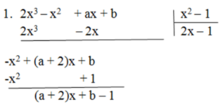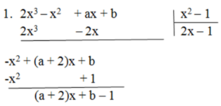
Hãy nhập câu hỏi của bạn vào đây, nếu là tài khoản VIP, bạn sẽ được ưu tiên trả lời.



Thương Q = x 2 - 2
Dư R = 9x – 5
Ta thấy x 4 - 2 x 3 + x 2 + 13 x - 11 = ( x 2 - 2 x + 3 )( x 2 - 2 ) + (9x – 5)
Vậy A = B.Q + R

Đặt \(f\left(x\right)=2x^3-3x^2+x+a\)
Ta có: phép chia \(f\left(x\right)\) cho \(x+2\) có dư là \(R=f\left(-2\right)\)
\(\Rightarrow f\left(-2\right)=2.\left(-2\right)^3-3.\left(-2\right)^2+\left(-2\right)+a\)
\(f\left(-2\right)=2.\left(-8\right)-3.4-2+a\)
\(f\left(-2\right)=-16-12-2+a\)
\(f\left(-2\right)=-20+a\)
Để \(f\left(x\right)\) chia hết cho \(x+2\) thì \(R=0\) hay \(f\left(-2\right)=0\)
\(\Rightarrow-20+a=0\Leftrightarrow a=20\)

làm ơn giúp mình bài toán hình phần d với cảm ơn nhiều( hình lớp 7 đó)![]()

`A+B=x^4 +5x^3 -x^2 -x+1+x^4 +2x^3 -2x^2 -3x+2`
`=2x^4 +7x^3 -3x^2 -4x+3`
`A-B=x^4+5x^3-x^2-x+1-(x^4 +2x^3-2x^2-3x+2)`
`=x^4+5x^3-x^2-x+1-x^4-2x^3+2x^2+3x-2`
`=3x^3+x^2+2x-1`


A(x) chia hết cho B(x) khi (a + 2)x + b – 1 là đa thức 0
Vậy a + 2 = 0 và b – 1 = 0 ⇒ a = -2 và b = 1


A(x) chia hết cho B(x) khi (a + 2)x + b – 1 là đa thức 0
Vậy a + 2 = 0 và b – 1 = 0 ⇒ a = -2 và b = 1

a:
Sửa đề: A=x^4-9x^3+21x^2+x+a
A chia hết cho B
=>x^4-2x^3-7x^3+14x^2+7x^2-14x+15x-30+a+30 chia hết cho x-2
=>a+30=0
=>a=-30
b: A chia hết cho B
=>x^4+2x^3-12x^3-24x^2+45x^2+90x-82x-164+a+164 chia hết cho x+2
=>a+164=0
=>a=-164

\(1,A⋮B\Leftrightarrow x^3-3x^2-ax+3=\left(x-1\right)\cdot a\left(x\right)\)
Thay \(x=1\)
\(\Leftrightarrow1-3-a+3=0\\ \Leftrightarrow a=1\)
\(2,A⋮B\Leftrightarrow3x^3-16x^2+25x+a=\left(x^2-4x+3\right)\cdot b\left(x\right)\\ \Leftrightarrow3x^3-16x^2+25x+a=\left(x-3\right)\left(x-1\right)\cdot b\left(x\right)\)
Thay \(x=1\)
\(\Leftrightarrow3-16+25+a=0\\ \Leftrightarrow a=-12\)
Thay \(x=3\)
\(\Leftrightarrow3\cdot27-16\cdot9+25\cdot3+a=0\\ \Leftrightarrow81-144+75+a=0\\ \Leftrightarrow12+a=0\Leftrightarrow a=-12\)
Vậy \(a=-12\)
